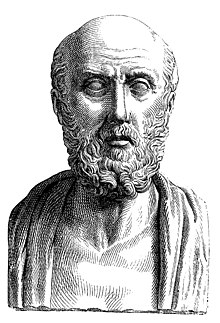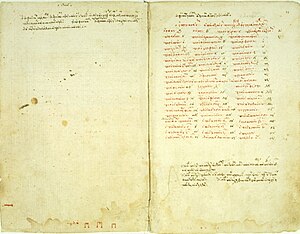
Back كوربوس أبقراط Arabic Corpus hipocràtic Catalan Corpus Hippocraticum Czech Corpus Hippocraticum Danish Corpus Hippocraticum German Ιπποκρατική Συλλογή Greek Hipokrataj verkoj Esperanto Tratados hipocráticos Spanish Corpus Hippocraticum Estonian Corpus Hippocraticum Finnish


The Hippocratic Corpus (Latin: Corpus Hippocraticum), or Hippocratic Collection, is a collection of around 60 early Ancient Greek medical works strongly associated with the physician Hippocrates and his teachings. The Hippocratic Corpus covers many diverse aspects of medicine, from Hippocrates' medical theories to what he devised to be ethical means of medical practice, to addressing various illnesses.[1] Even though it is considered a singular corpus that represents Hippocratic medicine, they vary (sometimes significantly) in content, age, style, methods, and views practiced; therefore, authorship is largely unknown.[2] The ancient commentaries on this corpus, from writers such as Attalion and Oribasius, are myriad. Hippocrates began Western society's development of medicine, through a delicate blending of the art of healing and scientific observations.[2] What Hippocrates was sharing from within his collection of works was not only how to identify symptoms of disease and proper diagnostic practices, but more essentially, he was alluding to his personable form of art, "The art of true living and the art of fine medicine combined."[3] The Hippocratic Corpus became the foundation upon which Western medical practice was built.[4]
- ^ Iniesta, Ivan (2011). "Hippocratic Corpus". British Medical Journal. 342: d688. doi:10.1136/bmj.d688. S2CID 220115185.
- ^ a b Cantor, David, ed. (2002). Reinventing Hippocrates. Aldershot, England: Ashgate. ISBN 978-0754605287. OCLC 46732640.
- ^ Ventegodt, Sø; Merrick, Joav (2012). The Purpose of the Medical Ethic of Hippocrates was Efficient Healing of the Patient. Hauppauge, NY: Nova Biomedical Books. pp. 155–162.
- ^ Pavlidis, N.; Karpozilos, A. (2004-09-01). "The treatment of cancer in Greek antiquity". European Journal of Cancer. 40 (14): 2033–2040. doi:10.1016/j.ejca.2004.04.036. ISSN 1879-0852. PMID 15341975.